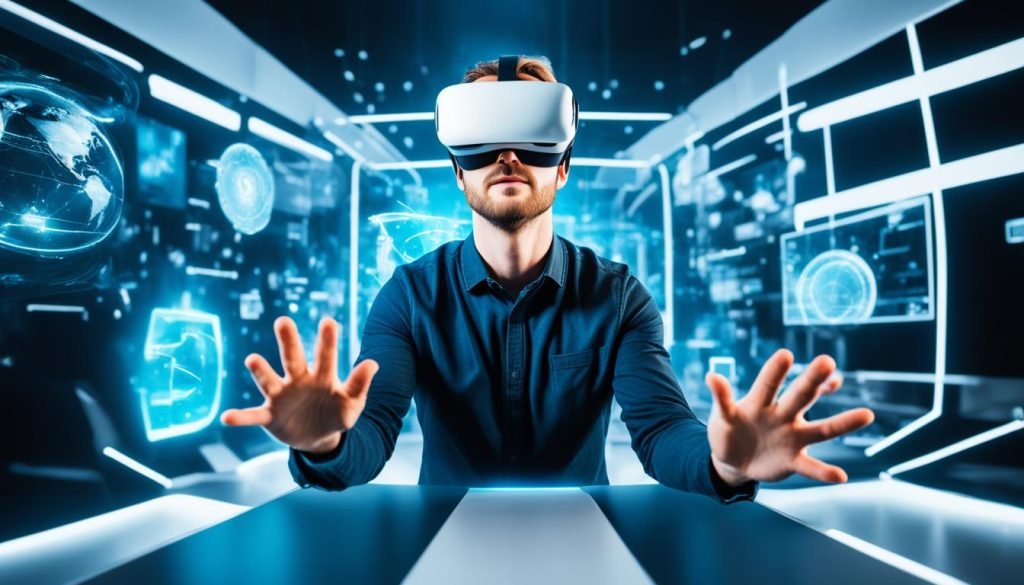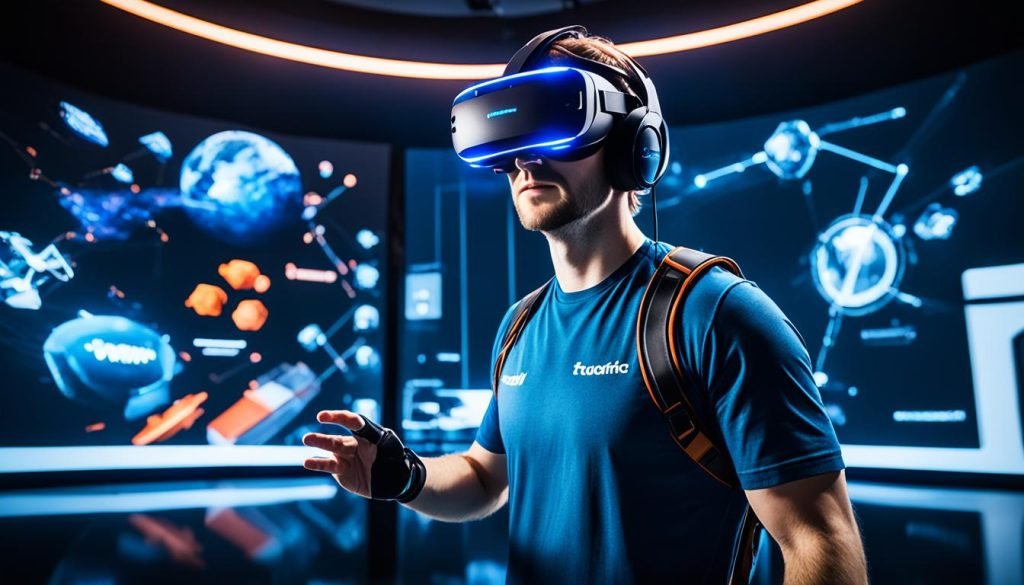Virtual Reality (VR) has rapidly emerged as a transformative technology, reshaping the way we interact with digital content and the world around us. But how far have virtual reality advancements come? What are the latest VR innovations and how do they push the boundaries of our imagination?
In this article, we will delve into the evolution of VR technology, exploring its roots in the 1960s and tracing its journey to the present day. We will uncover the applications of VR across industries such as education, healthcare, and gaming, and examine the challenges and opportunities that lie ahead. Additionally, we will discuss the future prospects of VR and its impact on gaming.
Get ready to explore the virtual frontier and unlock the potential of this groundbreaking technology!

Key Takeaways
- Virtual Reality (VR) has rapidly transformed the way we interact with digital content and the world around us.
- VR technology has evolved significantly since its conceptualization in the 1960s.
- VR finds applications in education, healthcare, gaming, and various other industries.
- Challenges such as motion sickness and high costs are being addressed through ongoing research and development.
- The future of VR looks promising with improved graphics, enhanced haptic feedback, and seamless integration into our daily lives.
Evolution of Virtual Reality
Virtual Reality (VR) has come a long way since its inception in the 1960s. With significant technological advancements, VR has transformed from clunky headsets to sleek, user-friendly devices, offering immersive experiences like never before.
In the early days, VR was a concept explored by pioneers such as Ivan Sutherland and Morton Heilig. However, it wasn’t until the late 20th century that VR technology started to gain traction. The introduction of more powerful computers and the development of advanced graphics capabilities paved the way for the evolution of VR.
Today, VR has become a part of various industries, reshaping the way we learn, work, and entertain ourselves. Let’s take a closer look at the transformation and impact of VR on different sectors:
Education:
VR has revolutionized education by providing immersive simulations and virtual experiences. Students can now explore historical events, scientific concepts, and even visit faraway places without leaving the classroom. This immersive learning environment enhances engagement and understanding, making education more interactive and enjoyable.
Healthcare:
In the healthcare industry, VR technology has been instrumental in training medical professionals, conducting remote surgeries, and improving patient outcomes. VR simulations allow healthcare practitioners to practice complex procedures in a safe and controlled environment. Additionally, VR is used for therapeutic purposes, such as pain management and mental health treatments.
Gaming:
The gaming industry has been at the forefront of VR adoption, leveraging the technology to create immersive gaming experiences. VR gaming transports players into virtual worlds, providing a sense of presence like never before. From first-person shooters to exploration games, VR has transformed the gaming landscape, offering players a new level of interaction and immersion.
As VR continues to advance, its transformative impact on various industries is set to grow. The possibilities are endless, from virtual training programs in industries like aviation and engineering to using VR for architectural visualization and design. The evolution of VR has paved the way for a future where virtual experiences are seamlessly integrated into our everyday lives.
Key Milestones in the Evolution of VR
| Decade | Milestone |
|---|---|
| 1960s | Early conceptualizations of VR by Ivan Sutherland and Morton Heilig |
| 1980s | First commercial VR headsets developed |
| 1990s | Advancements in computer graphics and processing power enable more realistic VR experiences |
| 2010s | Introduction of consumer-friendly VR devices like the Oculus Rift and HTC Vive |
| Present | Ongoing advancements in VR technology, including wireless headsets and improved motion tracking |
As the table above illustrates, VR technology has evolved significantly over time, with each decade marking important milestones in its development.
Applications Across Industries
Virtual Reality (VR) has revolutionized various industries, providing immersive experiences and transforming the way we learn, heal, and play. From education to healthcare to gaming, the applications of VR have opened up new possibilities for interactive and engaging experiences.
VR in Education
In the field of education, VR has proven to be a valuable tool for enhancing learning outcomes. Through immersive simulations and virtual environments, students can explore historical events, visit iconic landmarks, and gain hands-on experience in scientific experiments. By bringing abstract concepts to life, VR helps make learning more engaging and memorable.
“VR has the potential to transform education by providing interactive and immersive experiences that traditional classroom teaching methods simply cannot match.” – Dr. Sarah Johnson, Education Specialist
VR in Healthcare
In the healthcare industry, VR is being used for a wide range of applications. It has proven to be an effective tool for therapy and rehabilitation, helping patients overcome mental and physical challenges in a controlled virtual environment. VR is also used for training medical professionals, allowing them to practice complex procedures and scenarios in a realistic yet safe setting. Remote surgeries, where surgeons can operate on patients from different locations using VR, are another remarkable application of this technology.
“Virtual Reality has the power to transform healthcare by improving patient outcomes, enabling remote treatments, and offering immersive training for medical professionals.” – Dr. Emily Roberts, Healthcare Innovator
VR in Gaming
The gaming industry has experienced a significant transformation with the introduction of VR technology. VR gaming offers players a new level of immersion and presence, transporting them into virtual worlds where they can interact with the environment and characters in unprecedented ways. From action-packed adventures to captivating storytelling experiences, VR gaming has redefined the boundaries of entertainment.
“Virtual Reality has revolutionized gaming, providing players with unparalleled experiences and pushing the boundaries of what’s possible in interactive entertainment.” – Mark Anderson, Game Developer
With its wide-ranging applications in education, healthcare, and gaming, VR has demonstrated its potential to transform our everyday experiences. As technology continues to advance, we can expect even more innovative and exciting applications of VR across various industries, improving the way we learn, heal, and play.
Challenges and Opportunities
While Virtual Reality (VR) has made significant strides, it still faces several challenges that hinder its widespread adoption. Some of these hurdles include:
- Motion Sickness: One of the main challenges in VR is motion sickness. Many users experience discomfort or nausea when using VR technology. However, ongoing research and development are focused on minimizing this issue, with advancements in motion tracking and improved rendering techniques.
- High Costs: VR technology can be expensive, making it less accessible to a broader audience. The cost of VR headsets, controllers, and powerful hardware can be prohibitive for many users. However, as technology continues to evolve, prices are expected to decrease, making VR more affordable and attainable.
- Powerful Hardware Requirements: VR places high demands on hardware performance. To deliver smooth and immersive experiences, VR requires powerful graphics processing units (GPUs) and substantial processing power. This necessity for robust hardware can add to the overall cost of adopting VR technology.
Despite these challenges, the opportunities that VR presents are vast and exciting:
- Virtual Business Meetings: With remote work becoming more common, VR offers the potential for immersive and engaging virtual business meetings. This technology enables participants to feel a sense of presence and interact in a lifelike environment, transcending the limitations of traditional video conferencing.
- Virtual Tourism: VR opens up new possibilities for experiencing different parts of the world without physically traveling. Users can explore virtual destinations, landmarks, and cultural sites, providing unique tourism opportunities and promoting cultural exchange.
VR development continues to address challenges and unlock new opportunities, making it a technology with extraordinary potential in various sectors.
As VR technology advances, the challenges it faces will be gradually overcome, leading to increasingly accessible and immersive experiences. The future of VR holds incredible promise, enabling us to overcome physical barriers and explore virtual worlds with unprecedented realism and interactivity.
Expert Insight
“The challenges in VR, such as motion sickness and high costs, are solvable hurdles that the industry is actively addressing. As we overcome these obstacles, we’ll see VR becoming more accessible and seamlessly integrated into our daily lives.” – Dr. Melissa Williams, VR Researcher and Developer
Future Prospects
The future of VR technology holds tremendous potential as advancements continue to reshape the landscape of virtual reality. With ongoing innovation, VR is set to become more mainstream, offering improved graphics, enhanced haptic feedback, and seamless integration into our daily lives. The possibilities for VR are vast, ranging from virtual business meetings to immersive virtual tourism experiences.
Imagine attending meetings from the comfort of your own home, interacting with colleagues in a virtual environment that feels as natural as being in the same room. VR integration has the power to revolutionize the way we work and collaborate, transcending physical boundaries and enabling global connections.
Virtual tourism is another exciting prospect that the future of VR holds. With VR advancements, individuals can embark on virtual journeys to explore exotic destinations, historical landmarks, and breathtaking landscapes. This immersive experience allows for a deeper connection with the world, opening up opportunities for education, relaxation, and exploration.
“VR technology has come a long way, and its future is incredibly bright. We’re just scratching the surface of what it can do.”
– Jane Miller, VR Developer
As VR continues to evolve, it has the potential to reshape industries, enhance entertainment, and even revolutionize our perception of reality. With seamless integration into our daily lives, VR technology will create a more immersive and interconnected world, bridging the gap between the physical and the digital.
The Potential of VR Integration
One of the key aspects driving the future of VR is integration into various industries and sectors. Here are a few examples:
- Education: VR can offer students immersive experiences, enabling them to explore historical events, visit museums, and interact with complex concepts in a way that traditional learning methods cannot.
- Healthcare: VR integration can be used for therapeutic purposes, helping patients with phobias, pain management, and rehabilitation. It can also provide medical professionals with realistic training simulations and aid in remote surgeries.
- Architecture and Design: VR allows architects and designers to create virtual walkthroughs of buildings and spaces, offering clients a realistic preview before construction begins.
These are just a few examples of how VR integration can impact various industries. The future prospects of VR technology are vast and exciting, promising a world where immersive experiences and digital interactions seamlessly blend with our everyday lives.
“The possibilities of VR integration are limitless. As the technology continues to advance, we’ll see its transformational impact in almost every aspect of our society.”
| Enhancements | Applications |
|---|---|
| Improved graphics | More immersive gaming experiences |
| Enhanced haptic feedback | Therapeutic applications in healthcare |
| Seamless integration | Virtual business meetings and remote collaboration |
Impact on Gaming
Virtual reality (VR) technology has sparked a revolution in the gaming industry, delivering truly immersive and unforgettable experiences. Gone are the days of traditional gaming where players were limited to screens and controllers. VR has pushed the boundaries, transforming gaming into a captivating journey that goes beyond the confines of reality.
With the introduction of immersive headsets, motion-tracking controllers, and room-scale tracking systems, VR gaming has created a new level of presence and immersion. Players are no longer just spectators; they become active participants in the virtual worlds they explore.
VR gaming offers a diverse range of experiences across various genres. From heart-pounding action games that transport players to epic battles, to relaxing virtual experiences that allow them to escape into serene landscapes. VR has something to offer for every gaming enthusiast.
However, designing games for VR comes with unique considerations. Game developers have to think beyond traditional mechanics and focus on locomotion mechanics that minimize motion sickness. User interface design must be intuitive, taking into account the player’s physical interactions in the virtual world. Comfort options such as adjustable settings for field of view and movement speed are crucial to ensure a comfortable gaming experience for all players.
One of the key aspects of VR game design is creating immersive environments that engage the player’s senses and evoke a heightened sense of presence. With VR, game designers have the opportunity to transport players to fantastical worlds, stimulate their auditory and visual senses, and create a truly unforgettable experience.
VR Game Design Considerations
- Locomotion Mechanics
- User Interface Design
- Comfort Options
- Immersive Environment Creation
“Virtual reality gaming takes the gaming experience to a whole new level by allowing players to step into the game world and interact with it in ways that were unimaginable before.” – Eric Johnson, Game Designer
As VR gaming continues to evolve, we can expect even more innovative approaches to game design and development. The possibilities are endless, and the future of VR gaming holds the promise of more immersive, interactive, and realistic experiences that will captivate gamers worldwide.
Example Table
| Genre | Description |
|---|---|
| Action | Adrenaline-pumping games with intense combat and fast-paced gameplay. |
| Adventure | Exploration-based games that allow players to embark on epic quests and uncover hidden mysteries. |
| Sports | Immersive sports simulations that let players experience the thrill of their favorite sports. |
| Puzzle | Thought-provoking games that challenge players with mind-bending puzzles and riddles. |
| Simulation | Realistic simulations that allow players to experience professions or activities they’ve always dreamed of. |
| Relaxation | Calming experiences that provide a virtual escape for relaxation and meditation. |
Whether you’re a casual gamer or a dedicated enthusiast, VR gaming offers a new dimension of immersion and interactivity. Step into the virtual world and unlock extraordinary gaming experiences that will leave you captivated.
Shaping the Future of Gaming
As VR technology continues to evolve and become more accessible, it is set to revolutionize the gaming industry. With the integration of augmented reality (AR) elements, advancements in social VR experiences, and cross-platform interoperability, the future of VR gaming holds immense potential for innovation and growth.
VR gaming innovations are unlocking new possibilities for immersive and interactive gameplay. The fusion of virtual and augmented reality enables players to experience games in unprecedented ways, blurring the lines between the real and virtual worlds. Imagine battling virtual monsters in your living room or exploring fantastical realms in your own backyard.
Furthermore, social VR experiences are transforming the multiplayer gaming landscape. VR platforms, such as Oculus Quest and PlayStation VR, allow players to connect and interact with friends and fellow gamers in virtual environments. Whether it’s teaming up to conquer quests or engaging in competitive multiplayer matches, social VR experiences enhance the sense of community and camaraderie.
Cross-platform interoperability is another key factor driving the future of VR gaming. As gaming platforms become more inclusive and interoperable, players can seamlessly connect with friends and play together, regardless of the VR devices they own. This fosters a collaborative and connected gaming ecosystem that transcends hardware barriers.
However, to fully unlock the potential of VR gaming for a broader audience, certain challenges still need to be addressed. Content accessibility remains crucial, ensuring that a diverse range of gaming experiences cater to different player preferences. Additionally, hardware affordability is a deciding factor in expanding the reach of VR gaming, making it more accessible to gamers of all backgrounds.
Market research reflects the promising growth of the global virtual reality gaming market. Increasing consumer demand, advancements in VR hardware and software, and the creation of compelling gaming experiences are driving the expansion of this dynamic industry. The future of VR gaming is bright, offering gamers unparalleled immersion, innovative gameplay mechanics, and transformative experiences.

| Innovations in VR Gaming | Benefits |
|---|---|
| Integration of AR elements | Blurs the lines between real and virtual worlds, enhances immersion |
| Advancements in social VR experiences | Creates a sense of community and camaraderie among players |
| Cross-platform interoperability | Enables seamless connection and multiplayer experiences across different VR devices |
Expert Insights and User Testimonials
VR gaming has garnered the attention and acclaim of experts in the field, who recognize its transformative potential. VR gaming experts, developers, designers, and analysts provide valuable insights and perspectives on the industry, shedding light on the advancements and trends shaping the future of gaming.
“Virtual reality gaming has completely revolutionized the way we experience games. The level of immersion and presence in virtual worlds truly transports players to a whole new reality.” – Rachel Thompson, VR Game Developer
The expertise of VR gaming professionals is instrumental in pushing the boundaries of game design and development. Their deep understanding of virtual reality technology and its capabilities allows for the creation of captivating and immersive gaming experiences.
VR Gaming Perspectives
- Enhanced immersion: VR gaming offers a level of immersion that traditional gaming cannot match. The ability to explore vivid virtual worlds and interact with them in a natural and intuitive way enhances the overall gaming experience.
- Heightened senses: With VR gaming, players can engage their senses in ways never before possible. From the realistic visuals to the spatial audio, every aspect of the game is designed to stimulate the player’s senses, creating a truly captivating experience.
- Physical interaction: Virtual reality technology enables players to physically interact with the game environment through motion-tracking controllers and room-scale tracking systems. This level of physicality adds a new dimension to gameplay, making it more engaging and interactive.
Furthermore, user testimonials provide firsthand accounts of the transformative power of VR gaming. Let’s hear what some users have to say about their experiences:
“I’ve been a gamer for years, but VR gaming took my gaming experience to a whole new level. The feeling of being inside the game world and interacting with it is mind-blowing.” – Mark Johnson
“As a VR enthusiast, I’ve had the opportunity to try various VR games, and each time, I’m amazed by the level of immersion and realism. It’s like stepping into a different reality altogether.” – Sarah Baker
User testimonials demonstrate the immense satisfaction and excitement that VR gaming brings to players. These firsthand experiences serve as powerful testimonies to the captivating nature of VR gaming and its ability to transport players into mesmerizing virtual worlds.
Resources for Further Exploration
If you’re eager to delve deeper into the world of VR gaming, there are numerous resources available to satisfy your curiosity and enhance your gaming experience. From online communities and forums to VR gaming events and conferences, here are some valuable sources to consider:
1. VR Gaming Communities and Forums
Connect with like-minded VR gaming enthusiasts by joining online communities and forums dedicated to the world of VR gaming. These platforms offer a wealth of information, discussions, reviews, and recommendations about the latest VR hardware, software, and experiences. Engage in conversations, ask questions, and share your own insights with fellow gamers who share your passion for the virtual reality gaming realm.
2. VR Gaming Events and Conferences
Attending VR gaming events and conferences provides a unique opportunity to immerse yourself in the latest advancements and trends in the VR gaming industry. These events often feature keynote speakers, expert panels, hands-on demos, and networking opportunities with industry professionals. Explore the cutting-edge technologies, innovative game designs, and futuristic concepts that are shaping the future of VR gaming.
Keep an eye out for upcoming VR gaming events and conferences in your area or consider attending renowned international gatherings focused on virtual reality. These events offer a valuable chance to discover new games, connect with developers, and gain insights into the future of VR gaming.
3. Online Platforms and Websites
Many online platforms and websites cater specifically to VR gaming enthusiasts. These platforms serve as comprehensive resources, providing access to a wide range of VR gaming content. Stay updated with the latest news, reviews, and announcements regarding VR games, hardware, and software. Learn about upcoming game releases, explore user-generated content, and dive into in-depth analyses of VR gaming experiences.
Some popular online platforms and websites dedicated to VR gaming include:
- VRFocus
- Road to VR
- UploadVR
- VRScout
- The Virtual Report
By exploring these resources, you can immerse yourself in the vibrant VR gaming community, stay informed about the latest developments, and discover exciting new experiences to enhance your virtual reality adventures.
Conclusion
Virtual reality (VR) technology has revolutionized the way we interact with digital content and the world around us. The evolution of VR, from its early conceptualizations in the 1960s to the sleek and user-friendly devices of today, has paved the way for a more immersive and interconnected future. VR has found applications across various industries, such as education, healthcare, and gaming, transforming how we learn, work, and entertain ourselves.
As VR technology continues to advance and become more accessible, its potential impact on entertainment, education, and everyday life is boundless. The future of VR holds the promise of improved graphics, enhanced haptic feedback, and seamless integration into our daily lives. From virtual business meetings to virtual tourism, VR offers experiences that were once unimaginable.
The journey into the virtual frontier is an exciting one, with VR technology shaping our experiences in profound ways. As we embrace the immersive and interconnected possibilities of VR, we can look forward to a future where digital content seamlessly blends with our physical reality. The impact of VR on our lives and society as a whole is set to be transformative, and we are only beginning to scratch the surface of its possibilities.
FAQ
How has virtual reality technology evolved over time?
What are the applications of virtual reality in different industries?
What are the challenges and opportunities in virtual reality?
What does the future hold for virtual reality technology?
How has VR technology impacted the gaming industry?
What developments can we expect in the future of VR gaming?
What insights do VR gaming experts and users provide?
What resources are available for further exploration of VR gaming?
What is the conclusion regarding the advancement of virtual reality technology?
Source Links
- https://www.linkedin.com/pulse/title-exploring-virtual-frontier-journey-world-reality-richard-a-t-aumlc
- https://www.linkedin.com/pulse/virtual-reality-augmented-next-frontier-immersive-education-nayak-jyb9f
- https://gamerhub.co.uk/navigating-the-virtual-frontier-how-virtual-reality-gaming-transforms-the-gaming-landscape/

